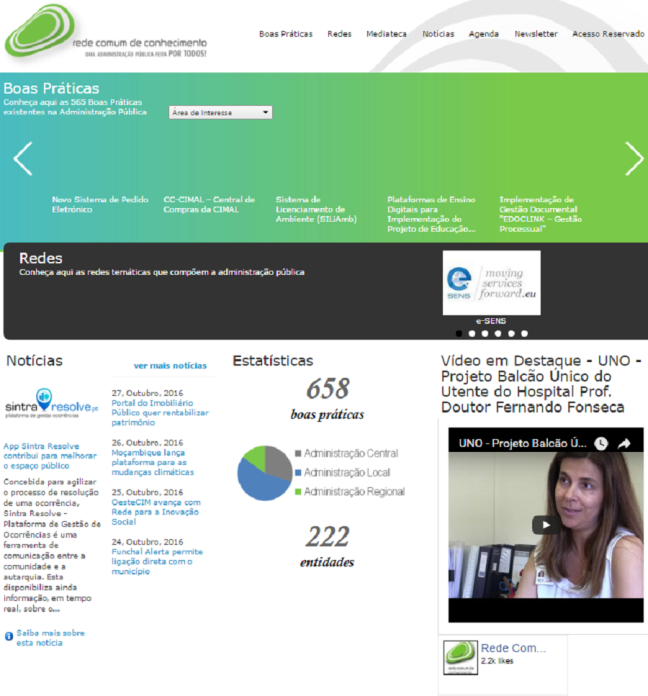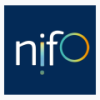The Portuguese Common Knowledge Network portal (RCC) is managed by the Agency for Modernisation of Public Administration (AMA). Today, it publishes more than 650 Best Practices, and continues to be an important tool for information sharing in the areas of modernisation, innovation and administrative simplification. More than 200 public organisations in Portuguese speaking countries have subscribed to the portal and use it to share knowledge and good practices.
Policy Context
AMA (Agência para a Modernização Administrativa) is the Portuguese Agency for modernisation of public administration and is the entity responsible for transversal interoperability in public administrations. In this sense it has to review all legislation that concerns Interoperability themes in public administration.
The iAP - Interoperability in Public Administration is a central, service-oriented platform, with the primary aim to provide the Public Administration with shared tools for interconnecting systems, identified federation, authentication, messaging, and payments. It also intend to enable, in an agile form and achieving economies of scale, the composition and availability of multichannel electronic services more closely to the needs of citizens and businesses.
A document Interoperability in Public Administration is available on the iAP platform. It describes all the necessary procedures for accessing various services accessible through the iAP and technologies required for integration of information systems.
In any case the Common Knowledge Network portal (RCC) is technology agnostic (no technical constraints imposed to the user). It is also based on the free choice for the end users (the public authorities of the participating countries) whether to take inspiration or not, to share the different projects or. An RCC newsletter regularly asks the stakeholders to share the initiatives that could be interesting for the rest of the Community and also feedback from past and current adopted projects.
Description of target users and groups
The portal targets mainly the public administrations of Portuguese speaking countries (that are invited to share ideas and also practices and implementation methods), as well as citizens, that can be conscious of many of the several projects and practices that have been developed in their country.
Description of the way to implement the initiative
The first version of the portal dates of beginning 2009 with a limited set of items and applications.
AMA centralizes the process via its internal technical support team. It is dedicated to the technical operation (resolution of specific issues as well as the publication and upload of the validated initiatives) and the administrative part (including the project evaluation and the update of contact points). The quality check of initiatives consists basically in the verification that the idea has been developed and implemented according to internal standards and shows already evidences of success so that an adoption of the same concept by another entity could be also successful.
Looking directly to the website, through the Directory you can access the initiatives in the Common Knowledge Network. To facilitate the research, they are grouped by theme and entity and everybody can find information about its objectives, the process of construction and development, results and impacts.
These examples of reference include initiatives of the public administrations of Portuguese Speaking Countries (CPLP), Portuguese Speaking African Countries (PALOP) and East-Timor. (All the list include then in alphabetical order Angola, Brazil, Cape Verde, Guinea Bissau, Equatorial Guinea, Mozambique, Portugal, Sao Tome and Principe, East Timor). Nonetheless Portugal and Brazil are the countries that published almost all the initiatives.

The portal is organized in order to facilitate the access to the different practices, the networks, the news and the agenda.
In the home page the more popular or more recent practices are put in evidence.
For example “The Seal School of Nutrition and Food” is a seal of quality, which seeks to
encourage, through a public distinction, schools to implement a set of
standards, guaranteeing the mandatory requirements for healthy food and hygiene,
health and food safety. Spread at the level of buffets, vending machines and school cafeterias”.
An important underlining is given to the links and contact support, where you can find all the relevant point of contact of the State agencies (essentially Portuguese for the time being) to facilitate the life of business and private citizens: for example the Citizens portal (including the Entrepreneur's Desk), or the State authentication authority for digital signature. Behind the “open RCC portal” there’s another site called “collaborative RCC”, is accessible only by public authorities and basically conceived in order to quickly respond to new legislative procedures especially by the most peripheral public entities (such as municipalities or general authorities that could have a specific task in a determinate domain to be accomplished). It is organized as a forum with a possibility of live and direct contact with different civil servants and to have the chance to see the query dispatched to the relevant person in order to get the directive and instruction as quickly as possible. Since the query is recorded it can be easily reused and applied by all the other interested public servants that could face a similar issue.
An important tool included in this collaborative RCC is the organisation of training for the public servants. They can then upgrade their grade of knowledge of a specific topic following a change of rule or a request of harmonization coming from the European Union or from another international organization.
Technology solution
There’s no specific technology used for the implementation of the portal. A user-friendly interaction and a simple grouping has been chosen to simplify the user navigation.
The portal is powered by MS SharePoint and the upload of the initiatives is done applying the corresponding approach and guidelines. The feasibility of decentralised management of the platform content has proven to be low. Substantially the AMA centralizes the request of publication, applies the quality check (described above) on the project and then proceed with publication.
Main results, benefits and impacts
As the practices published are so many and constantly increasing, the share and the popularity of the initiatives is well spread on all the interested countries and becomes more and more frequent.
The success of the RCC concept is shown through the two hereunder examples:
- The first one is the Environmental licensing system (SILiAmb) of the Environmental Minister. This licensing was made essentially in paper form. The SILIAmb made it possible to reduce bureaucracy and provide a service to the citizen in a better, faster and harmonised way at national level.
- The second one is a project developed by the municipality of Agueda concerning Digital education project in schools. It foresees the creation of classrooms with integrated technology systems of hardware, software and platforms that should constitute the core of the school ecosystem focused on teaching and learning component. The project, raised from a local authority, is then shared and followed by other municipalities and followed up by the Minister of Education.
Lessons learnt
Since the start of the first version back in 2009, a short list of weak points is identified.
A first one, concerns the difficulty with the SharePoint that leads AMA to centralize the governance and the management of the portal, while the starting idea foresaw a widespread governance upon all the participant authorities. The idea of rethinking a new RCC allowing a more decentralised governance distributed among all stakeholders (with eventual user-friendly open source tools to be adopted) has already popped up and is under discussion.
Another issue is about the lack of resources which doesn’t allow to validate the translation made towards English and Spanish. Using automated translation tool, the portal content can’t be 100% proof-read.
Scope: Cross-border, International, Local (city or municipality), National
